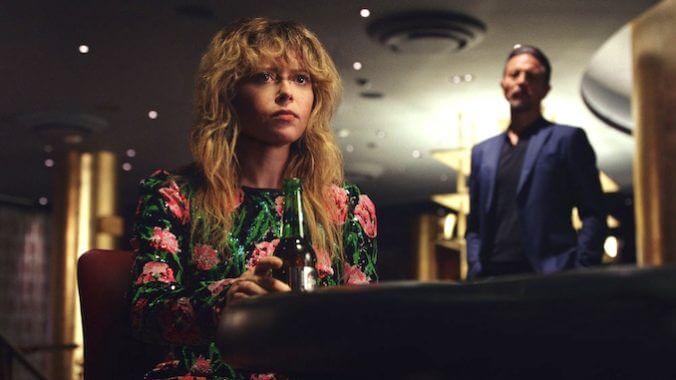Poker Face Finale: This Is Charlie Cale’s World, We’re Just Dying in It
Photo Courtesy of Peacock

With its slick, sure-footed finale, Poker Face cuts a new detective from a classic cloth and releases her unto the world. As all good endings do, “The Hook” dragged our shaggy-haired bullshit-detector back to where it all started: the death of casino magnate Sterling Frost Jr. (Adrien Brody). His father, Sterling Frost Sr. (Ron Perlman) sent his heavy Cliff Legrand (Benjamin Bratt) after the hightailing Charlie—a pursuit across state lines that, as we learn, took Cliff over 12 calendar months. Bratt is a welcome and incredibly natural part of Poker Face’s noir-tinged, scenery-chewing ensemble, and getting his own extended contextualizing flashback is exactly what the ticking clock that’s chased Charlie all season needs. It’s also very satisfying to see his whole journey has been a massive pain in the ass.
What we took for a ruthless terminator is actually a constantly frustrated lackey who, after being strung along by Frost Sr.’s conviction to get Charlie back in his clutches, is seriously reconsidering considering the conditions of his loyalty. Johnson’s team of writers know exactly how to inject thriller archetypes with a genuine humanity, and understand how humor can disarm a character’s veneer of cold-bloodedness. But after her near death experience at the hands of Joseph Gordon Levitt in the delightfully twisted “Escape from Shit Mountain” (no joke, I once wrote a D&D game with the same title), Charlie is holed up recuperating in a Denver hospital—and Frost wants Cliff to wait out her recovery (an additional two months!) before she’s delivered to him. Cliff cannot tolerate any more disrespect, and so, as we learn after Charlie is framed for executing Frost at gunpoint, Cliff sells out his boss to a rival casino honcho, Beatriz Hamp (voiced by Rhea Perlman, in perhaps a Big Bad setup for Season 2?)
It’s great seeing the same mystery plot structure turned on pre-existing characters like Cliff, in a move that lines “The Hook” up with the rest of the season while still feeling like a suitably finale-type switch-up. Despite a bit of a sag around the middle, Poker Face has a major success story for serialized television, but it’s not been unaffected by criticism. Each episode is packed with coincidences, not only that Charlie finds herself at the scene of a complicated murder, but that her presence allows all the contributing factors to unravel in a way where she—and only she—can prove the crime. Take “Escape from Shit Mountain;” literally every character other than Charlie is personally tied to an old murder we have just learned of, and her presence is crucial to bringing it up to the surface. It begs the question, how constructed is the world of Poker Face, and how much of it serves the singular purpose of facilitating Charlie’s singular skillset?
This critique could be leveled at any episodic detective show, and while it’s forgivable somewhere with a big body count like Columbo’s Los Angeles, it gets more egregious the more specific a setting is: take the obscene amount of homicide in Britain’s rural Midsomer Murders. Such a criticism, however, misses the point of these stories; this is not a reflection of reality, but a fictional version of it that’s supposed to bend around an equally-constructed detective character. There aren’t people like Charlie or Columbo in real life, people who can trick confessions out of highly-strung criminal masterminds and notice cutesy clues that unravel a whole alibi.
-

-

-

-

-

-

-

-

-

-

-

-

-

-

-

-

-

-

-

-

-

-

-

-

-

-

-

-

-

-

-

-

-

-

-

-

-

-

-

-








































